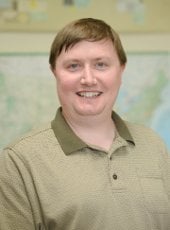Dean Hemmer, Dean of The College of Sciences and Arts, said he was pleased to announce that Don Lafreniere has accepted the position of chair of Social Sciences.
“Leading a department housing so many different disciplines is a challenge and I am confident that Don is more than prepared for the task,” Hemmer said. “His extensive leadership experience, both inside and out of academia, together with his distinguished scholarly record, made him a clear choice for the position.”

Lafreniere (la-fren-YAY), an associate professor of geography and GIS, also directs the Geospatial Research Facility and the Historical Environments Spatial Analytics Lab. He holds BS degrees in geography and history from Eastern Michigan University. He earned his Ph.D. in geography from the University of Western Ontario.
He took a unique route to Michigan Tech — his first career was working for Marriott and Princess Cruises managing hotels, lodges, and portfolios. Lafreniere, who has been at Tech since 2014, answered a few questions about himself and his plans for the department.
Why Michigan Tech? What brought you here?
Growing up in the Sun Parlour of Canada, in Windsor, Ontario, I also longed to live in the north. I had a chance to live in Alaska for a few years and wished to return to a northern climate when I was seeking out a faculty position.
But the size of the institution played a large part. Tech is large enough to be a genuine research institution but small enough to be a community. Communication is easy here. “If I need to reach someone in another department, or say, the provost, It’s not hard.”
The other major factor was that we really have a robust heritage community. When I first flew into CMX, the landing path took us over the dredge (Quincy Dredge No. 2 in Torch Lake). Seeing the dredge and the stamp mill behind it I thought: This is a living, robust landscape that I want to live and work in.
The department is unique. What Social Sciences is to us at MTU, would be eight different disciplines somewhere else. That creates truly interdisciplinary scholarship because of how freely we interact across disciplines. What we do here is special.
Because geography is the scientific study of space, and everything is somewhere, geographers can study anything. In my research, I help my colleagues and students think about the impacts of spatial relationships in a different way. My expertise is in GIS (geographic information science) and using historical information to learn how populations and places change through time and impact society today.
I love it when a student realizes, through mapping some data, that the societal issues they have heard about in the news or in another class can be visualized.
What do you like about teaching?
We have hardworking students who are innately curious. And as someone who is not teaching to majors (as we do not have a geography program at Tech), I can take the best of my discipline and apply it to situations in our students’ everyday lives in ways students can understand.
I love it when a student realizes, through mapping some data, that the societal issues they have heard about in the news or in another class can be visualized. An example would be a student exclaiming, “I had no idea that racial segregation is so bad in my hometown” It connects the theoretical ideas to their actual lives. And generally what follows is a flood of questions.
You mentioned that you want to work on the department’s branding message to potential students and parents. What will your goals be?
We do need to get across the unique nature of our programs. A big focus of our department is how we work with communities in our research and teaching. This creates a unique, applied social scientific, signature experience for our students that we need to market more to potential students.
You have four children and live in Boston Location. But we need to know: What’s with the giant antenna?
I do have a 100-foot radio tower in the yard. I’ve been an amateur radio operator since I was a teenager. I met my wife of 23 years, Erin, on the radio. [Editor’s note: Immediately before this interview, Lafreniere was talking about the pandemic over his radio with someone in Micronesia.]